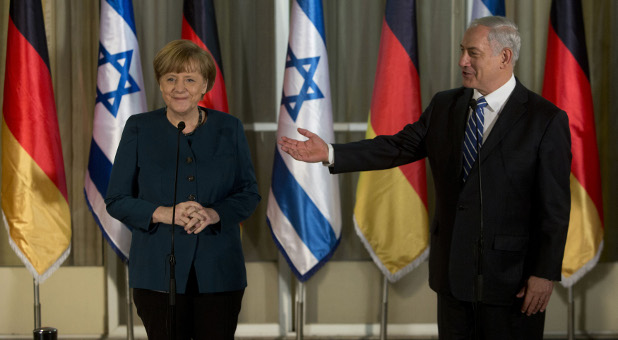Germany views Iran as a potential threat not just to Israel, but also to European countries, German Chancellor Angela Merkel said Tuesday at a news conference in Jerusalem with Prime Minister Benjamin Netanyahu.
“We see the threat not just as a threat for the state of Israel but as a general threat for Europe as well,” Merkel said.
Earlier on Tuesday, Israeli and German government ministers met for a joint cabinet meeting as part of a daylong series of meetings between the governments of both countries to improve bilateral relations and discuss regional developments.
“We meet through turbulent times. There’s a great convulsion that is taking place between the straits of Gibraltar and the Khyber Pass,” Netanyahu said. “Everything seems to be shaking, convulsing, changing, yet I would say that Israel is an island of stability, security and prosperity in this sea of instability.”
Merkel arrived in Israel on Monday for a two-day visit, accompanied by 16 ministers. This is the fifth time the Israeli and German governments have met, and this year marks 50 years of diplomatic relations between the two countries.
On Monday evening, Merkel dined with Netanyahu at his official residence in Jerusalem. Prior to their meal, Merkel said she is “interested in seeing two states for two peoples in a final [peace] agreement—a Jewish state and a Palestinian state.”
Merkel said Germany and Israel have “a very strong friendship, which ties our two countries together, and a friendship that we want to continue to develop further.”
Netanyahu told Merkel, “Our nations share tragedy and hope, great friendship and cooperation.”
“Of course, the people of Israel want a real peace, a peace that ends the conflict and finally gets the Palestinians to recognize the Jewish state,” Netanyahu said.
The dinner Netanyahu and Merkel shared was prepared by leading Israel chef Moshe Segev, and the meal was accompanied by Merkel’s preferred Israeli wines. Sara Netanyahu presented Merkel with a silver and turquoise necklace.
Netanyahu and Merkel met on Tuesday to discuss the Iranian nuclear issue as well as the peace negotiations. Germany is one of the world powers negotiating a final nuclear deal with Iran. Netanyahu was expected to ask Merkel to ensure the Iranians are no longer able to enrich uranium.
Meanwhile, the visiting German ministers met with their Israeli counterparts to sign a series of agreements. Among others, they signed agreements on cooperation in foreign relations, including one that will allow Israelis traveling in Germany for a six-month period to work there. The ministers also signed economic cooperation agreements, trade and energy agreements, agreements for cooperation on projects in developing countries and for cooperation in the preservation of Tel Aviv’s Bauhaus architecture.
Representatives from both countries also discussed maritime security. Israel is interested in acquiring a German defense system for the gas rigs along the Israeli coast, in what would be a half-billion shekel ($142 million) deal.
“Chancellor Merkel is a friend of Israel,” said Netanyahu Monday at the opening of a Likud faction meeting. “She takes stances against boycotts and against initiatives that threaten to boycott Israel.”
President Shimon Peres was to present Merkel with the Presidential Medal on Tuesday.
Merkel was expected to announce during her trip a new German law that will offer restitution to Holocaust survivors who worked in ghettos under Nazi control. The payments, amounting to some 200 euros (about $275) monthly, will be offered to about 20,000 Holocaust survivors. Survivors who have had their claims for restitution rejected in the past will be eligible for retroactive payments from 1997 on, under the new law. Senior Citizens Minister Uri Orbach will help oversee implementation of the legislation.
Foreign Minister Avigdor Lieberman hosted the German ministers for dinner at the David Citadel Hotel in Jerusalem on Monday evening. At the beginning of the meal, Lieberman said the relationship between Germany and Israel contributes significantly to Israel’s cooperation with the European Union.
Only hours before Merkel’s arrival in Israel, German Foreign Minister Frank-Walter Steinmeier condemned Israel’s settlement policy, calling Israeli construction in Judea and Samaria “disruptive” to peace efforts.
For the original article, visit israelhayom.com.















































